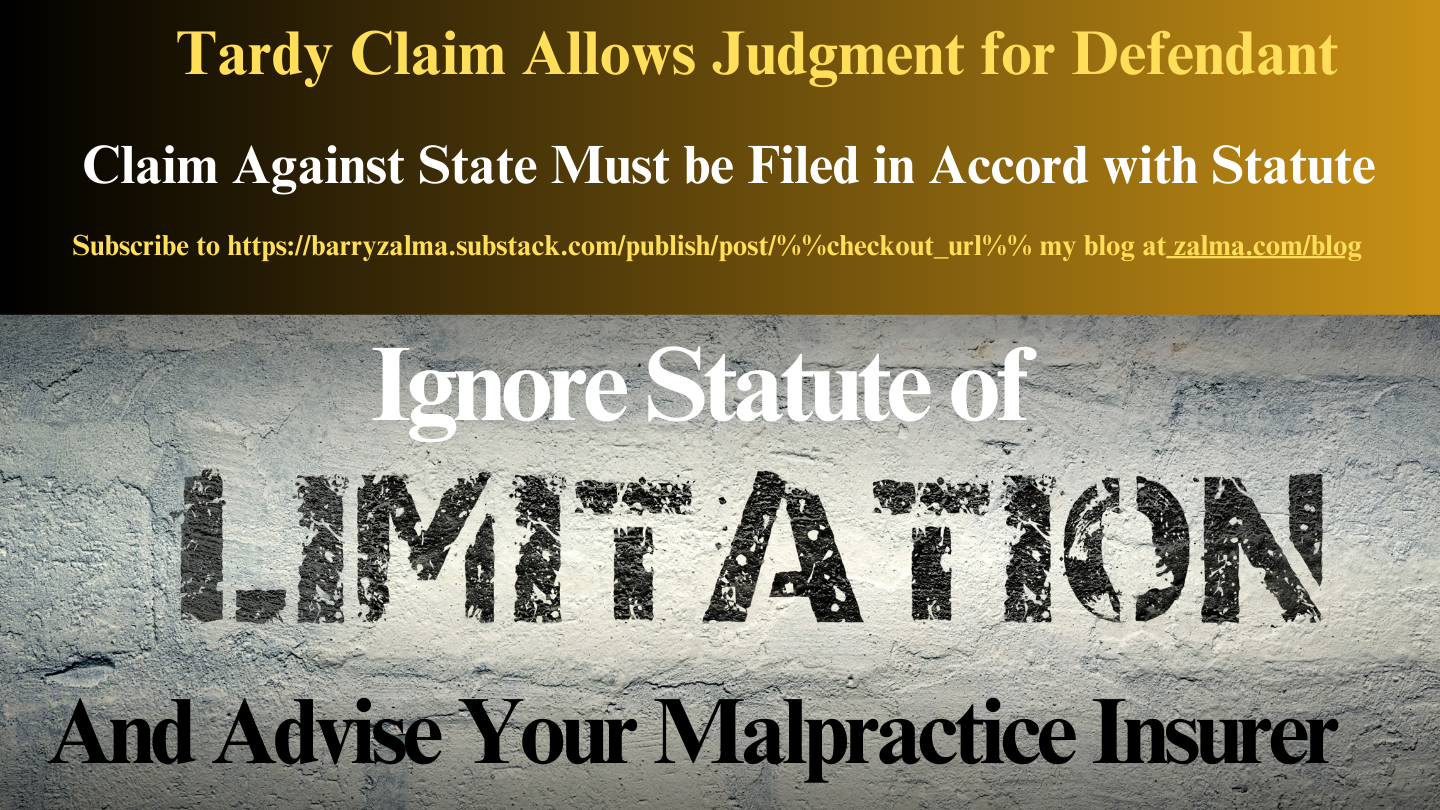-
News Feed
- EXPLORE
-
Pages
-
Groups
-
Events
-
Blogs
-
Marketplace
-
Offers
-
Jobs
-
Developers
Tardy Claim Allows Judgment for Defendants

Tardy Claim Allows Judgment for Defendant
Read the full article at https://lnkd.in/gQ5kWitz and see the full video at https://lnkd.in/gMZeEa9e and at https://lnkd.in/gXUbA98m and at https://zalma.com/blog plus more than 4650 posts.
Claim Against State Must be Filed in Accord with Statute
In Angela Erika Cantu v. California Department Of Transportation et al., F084601, California Court of Appeals (November 30, 2023) Angela Cantu sued the California Department of Transportation (Caltrans) and James Hinson for alleged injuries sustained in a motor vehicle incident. Because she failed to file a proper and timely claim the trial court granted summary judgment to Caltrans and Hinson and Cantu appealed.
FACTUAL BACKGROUND
Angela Cantu and James Hinson, a Caltrans employee, were involved in a motor vehicle collision on State Route 168 in Fresno. Two months later, on August 17, 2018, Caltrans received, via facsimile, a letter from counsel retained by Angela Cantu.
Richard Maynard, an analyst with the California Department of General Services, responded to Cantu's "letter of representation dated 8-17-2018," and shortly thereafter informed Cantu's attorneys that he would be "handling this file for the State of California." Maynard advised counsel that "The State of California has a six-month statute of limitation. If your claim is not resolved within six months from the date of loss, California law requires you to file a formal claim with the Government Claims Program (GCP) (Government Code 900, et seq.).
Cantu's counsel took no further action until January 8, 2020, over 18 months after the underlying traffic collision. In the meantime, the six month claim period lapsed on December 19, 2018. Eventually, on January 8, 2020, Cantu's counsel filed a Government Claim form, along with the $25 filing fee and an application to file a late claim. Thereafter Cantu filed a complaint in the Fresno County Superior Court.
Caltrans and James Hinson filed a motion for summary judgment on grounds that Cantu had failed to file an appropriate claim under the Government Claims Act, a mandatory prerequisite to filing a lawsuit. Judgment was subsequently entered in favor of Caltrans and James Hinson. Cantu appealed.
DISCUSSION
Trial Court Properly Granted Summary Judgment Based on Cantu's Failure to Comply with the Government Claims Act
The trial court found Cantu had not complied with the claim presentation requirement of the Government Claims Act in this matter. Since plaintiff's counsel's letter does not touch on many of the required elements of a claim as specified in Government Code section 910, there was no substantial compliance.
Cantu's Claims are Barred Under the Government Claims Act
The California Government Claims Act (Gov. Code, § 900 et seq.) requires a plaintiff seeking money damages against public entities and public employees acting within the scope of their employment, to file an initial claim with the relevant public entity.
While Cantu's August 17, 2018 letter references a motor vehicle accident, it did not describe the circumstances of the accident nor any alleged injuries. More importantly, the letter does not specify the type of resolution contemplated by Cantu or whether a lawsuit was anticipated. Accordingly, the August 17, 2018 letter did not substantially comply with the Government Claims Act.
Here, the August 17, 2018 letter sent to Catrans on behalf of Cantu, was signed by a paralegal at a law firm. There is nothing in the subject letter that makes it readily discernible that appellant was making a compensable claim against the relevant government entity or that the failure to satisfy it would result in litigation nor an explanation why there was no response to the Cal Trans letter advising of the limitations. Therefore, Cantu's letter of August 17, 2018, was not a "claim as presented" and did not trigger the notice-or-waiver provisions of Government Code sections 910.8 and 911.
The Court of Appeals was unable to find an error in the trial court's analysis and affirmed it decision.
ZALMA OPINION
Statutes of limitation prevent stale claims. The paralegal's initial letter was sufficiently prompt and the law firm was advised by the state of the need to comply with the statute. Rather, counsel did nothing for more than two years. The decision of the trial court was easy and obvious. Ms. Cantu is not without a remedy for her injuries, she can sue her lawyer to recover the damages she could have recovered if his sloth and inadequate response had not occurred.
(c) 2023 Barry Zalma & ClaimSchool, Inc.
Please tell your friends and colleagues about this blog and the videos and let them subscribe to the blog and the videos.
Subscribe to Excellence in Claims Handling at locals.com at https://zalmaoninsurance.locals.com/subscribe or at substack at https://barryzalma.substack.com/publish/post/107007808
Go to Newsbreak.com https://www.newsbreak.com/@c/1653419?s=01
Follow me on LinkedIn: http://www.linkedin.com/comm/mynetwork/discovery-see-all...
Daily articles are published at https://zalma.substack.com. Go to the podcast Zalma On Insurance at https://podcasters.spotify.com/pod/show/barry-zalma/support; Go to Barry Zalma videos at Rumble.com at https://rumble.com/c/c-262921; Go to Barry Zalma on YouTube- https://www.youtube.com/channel/UCysiZklEtxZsSF9DfC0Expg; Go to the Insurance Claims Library – http://zalma.com/blog/insurance-claims-library.
Please tell your friends and colleagues about this blog and the videos and let them subscribe to the blog and the videos.
Go to Newsbreak.com https://lnkd.in/g8azKc34; Go to the Insurance Claims Library – https://lnkd.in/gwEYkxD.
We are 100% funded for October.
Thanks to everyone who helped out. 🥰
Xephula monthly operating expenses for 2024 - Server: $143/month - Backup Software: $6/month - Object Storage: $6/month - SMTP Service: $10/month - Stripe Processing Fees: ~$10/month - Total: $175/month
- Art
- Causes
- Crafts
- Crime
- Dance
- Drinks
- Film
- Finance
- Fitness
- Food
- Games
- Gardening
- Health
- Home
- Literature
- Music
- Networking
- Paranormal
- Other
- Politics
- History
- News
- Party
- Science
- Religion
- Shopping
- Sports
- SyFy
- Politically Incorrect
- Philosophy
- Theater
- Technology
- Wellness



